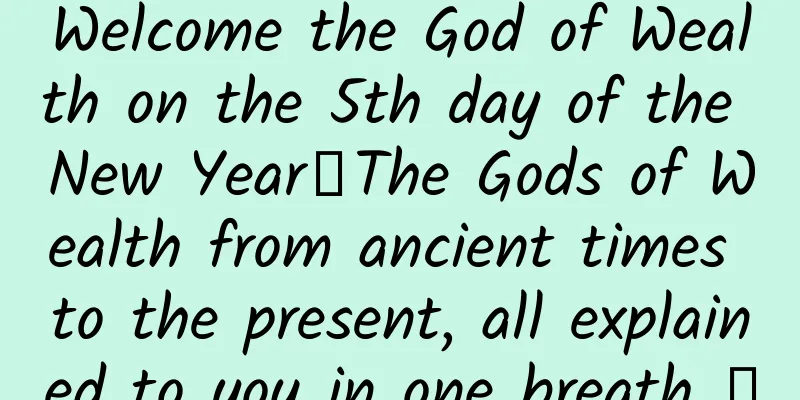Welcome the God of Wealth on the 5th day of the New Year|The Gods of Wealth from ancient times to the present, all explained to you in one breath →

|
It is the day to welcome the God of Wealth on the fifth day of the first lunar month . The God of Wealth is one of the most beloved gods in China today, and it also represents people's simple yearning for a better life. Today, I will list the gods of wealth from ancient times to the present, and "welcome" all the gods of wealth from ancient times to the present. Ancient Relics Luxing The original trace of the "God of Wealth" can be traced back to the " Si Lu " of the pre-Qin and Han dynasties. The Book of Zhou Li: Spring Officials mentioned that when offering sacrifices to heaven, the number of grains should be reported to Si Lu. Zheng Xuan of the Eastern Han Dynasty commented: " Si Lu is the sixth star of Wenchang ... Lu means grain. When the grain is high, the Lu will be determined later." On the fifth day of the first lunar month of the Year of the Snake, Wenchang Star will hang diagonally above the Big Dipper. In ancient times, wealth and income were mostly calculated in terms of grain. Zheng Xuan interpreted "Lu" as "Gu", and there is also a connection between ancient pronunciations. "Lu" and "Gu" have similar ancient pronunciations. In ancient times, salary was grain. In the Spring and Autumn Period, Duke Ling of Wei asked Confucius, "How much salary do you get when you live in Lu?" Confucius replied, "60,000 grains of millet." Millet is millet. Si Lu is the earliest star in charge of wealth in literature, and is still worshipped as one of the three stars of Fu, Lu and Shou. Copyright images in the gallery. Reprinting and using them may lead to copyright disputes. Kitchen God Since the Warring States Period, the use of gold has become more and more frequent. In the Han Dynasty, the monetary properties of precious metals were increasingly valued. This desire for gold gave birth to a new god of wealth. The Taoist priest Li Shaojun said to Emperor Wu of the Han Dynasty: "If you worship the stove, you will get something. If you get something, cinnabar can be turned into gold. If gold is made into food utensils, you will live longer. If you live longer, you can see the immortals in Penglai in the sea. If you see them and offer sacrifices to the gods, you will not die. Huangdi is one of them." As a result, the primitive household god, the stove god, gradually had the function of praying for wealth . It is recorded in the "Customs and Meanings" of the Eastern Han Dynasty that during the reign of Emperor Xuan of the Han Dynasty, Yin Zifang used yellow sheep to sacrifice to the stove god, and his descendants became rich, which triggered the worship of the stove god by the whole people. Copyright images in the gallery. Reprinting and using them may lead to copyright disputes. "Brother Kong Fang" In the early years of the Western Jin Dynasty, the country was peaceful, and a group of super-rich people like Shi Chong and Wang Kai emerged. The social trend of loving money was prevalent. Lu Bao wrote "On the God of Money". In view of the social trend that "money can make the devil work", he called "Brother Kong Fang" a "goddess". It can also be regarded as the earliest " money fetishism ". Copyright images in the gallery. Reprinting and using them may lead to copyright disputes. God of Wealth The worship of the God of Wealth is divided into legitimate wealth and illicit wealth . The worship of illicit wealth seems to have a longer history. Money and sex hurt people, and the ancients knew this truth long ago, so monsters and ghosts that can attract money also appeared in legends very early. Cat ghost moving money The Dugutuo Cat Ghost Case recorded in the Book of Sui is a famous case in which a ghost was used to make extra money. Dugu Tuo was the half-brother of Empress Dugu Jialuo of Emperor Wen of Sui. Dugu Tuo's grandmother kept a cat ghost at home, which could haunt and kill people. After each murder, "the property of the deceased family was secretly moved to the cat ghost's home." Empress Dugu of Emperor Wen of Sui and wife Zheng of Minister Yang Su were both sick at the same time, and doctors diagnosed them with "cat ghost disease." Emperor Wen of the Sui Dynasty knew that Dugutuo's family had this kind of strange skill, so he sent people to interrogate them. According to Xu Ani, a maid of Dugutuo's family, Dugutuo once asked his wife for wine, but his wife said that the family had no money to buy wine. Dugutuo then asked Xu Ani to release cat ghosts to the wealthy minister Yang Su's family, and even to the queen's family in order to get more money and property from the queen. After the case was investigated, Emperor Wen of the Sui Dynasty issued an order to the whole country that anyone who raised cat ghosts to kill people and move money would be exiled to the border. I wonder if the so-called " lucky cat " is also related to the legend of "cat ghost moving money". Copyright images in the gallery. Reprinting and using them may lead to copyright disputes. Five Gods The more famous partial god of wealth among the people is the " Wutong God " which has been very popular since the Song Dynasty. It is said that the saying of "Five Roads God of Wealth" originated from "Wutong". But there are different opinions about what the "Wutong" really is. Some say it is a mountain spirit or a wood monster, some say it is a one-legged mandrill, some say it is the Five Manifestations of the Gods, and some even say it is the incarnation of the five magical powers of Buddhism: "divine realm, divine eyes, divine ears, telepathy and past wisdom". However, judging from Yijianzhi, Liaozhai and various folk legends, Wutong is mostly a kind of evil god worshipped by lewd people. There are many stories about Wutong God in Yijianzhi by Hong Mai of the Southern Song Dynasty. His deeds include accepting human sacrifices, raping women, and making people "suddenly rich and suddenly poor". In the book "One-legged Wutong", the prototype of the ghost is the one-legged mandrill. The Ming Dynasty "Daofa Huiyuan" records that the ghost can "bewitch women, carry treasures to empty rooms, and make the poor rich and the rich poor." The custom of seeking wealth from Wutong reached its peak in Suzhou during the Ming and Qing Dynasties. The custom of receiving wealth on the fifth day of the first lunar month was recorded in Feng Menglong's "Stories to Warn the World: Jin Lingshi's Beautiful Maid Given to a Handsome Boy" in the late Ming Dynasty: "On the fifth day of the first lunar month, it is a custom in Suzhou that every household offers sacrifices to the five gods, which is called burning lucky money. After eating the lucky money meal, they go out to do business." The center of Suzhou's belief in Wutong God is the Wutong Temple on Shangfang Mountain beside Suzhou's famous Shihu Lake. Because of the prosperity of the sacrifices, Shangfang Mountain and Shihu Lake are also called "Meat Mountain and Wine Sea". Guan Gong In the early Qing Dynasty, the Neo-Confucianist Tang Bin ruled Jiangnan and vigorously cracked down on obscene worship in Jiangnan, destroying the Wutong Temple on Shangfang Mountain. In order to change the customs, he advocated replacing evil gods with righteous gods, and changed the Wutong Temple to a Guandi Temple that worshipped the loyal and righteous. But the ice is not formed in a day, and the folk belief in the Wutong God of Wealth has been around until the late Qing Dynasty and the Republic of China. Today's concept of welcoming the God of Wealth and the Five Gods of Wealth on the fifth day of the first lunar month is closely related to the Wutong God. Even the righteous God of War Guan Yu was inevitably infected with the belief in seeking wealth, and eventually became the so-called "Martial God of Wealth" . Copyright images in the gallery. Reprinting and using them may lead to copyright disputes. Industry God The official origin of the belief in the God of Wealth generally dates back to the Northern Song Dynasty. Meng Yuanlao's "Dongjing Menghualu" and Wu Zimu's "Menglianglu" recorded the Song Dynasty's annual custom of posting paper horses. According to today's folk customs, it is a kind of paper print with images of gods and auspicious patterns printed on it. "Dongjing Menghualu" has "the dull donkey of the wealth gate and the deer horse turning back", and "Menglianglu" has "the wealth horse", which may be related to the God of Wealth. In addition, many of the positive gods of wealth, which are opposite to the partial gods of wealth, are related to the industry gods since the Tang and Song dynasties. The earliest industry god is said to be Lu Yu, the tea saint. Since the late Tang Dynasty , all walks of life have had ancestral gods who bless their own industries. The industry gods of merchants who are best at seeking wealth and profit later became the gods of wealth. The most typical of them are the so-called Wen Cai Shen Fan Li and Zhonglu Cai Shen Wang Hai . Wang Hai was the first king of the Shang Dynasty. Ancient history records that he rode on oxen and horses and went to the north to do business with the Yi family and was killed. In modern times, he is revered as the ancestor of merchants. Of course, in addition to the vague business experience in ancient history, Wang Hai can become the patron saint of business. More importantly, the name of the Shang Dynasty happened to overlap with the "Shang" in "business". Although in fact, there is no direct connection between the two. Portrait of Lu Yu, from the Qianlong period of the Qing Dynasty, Explanation of Portraits of Famous Officials of All Dynasties Relatedly, Bigan, the prince whose heart was gouged out by King Zhou, became the God of Wealth, largely due to the reputation of the Shang Dynasty. Portrait of Bigan Among the literary gods of wealth, there are Fan Li and Duanmu Ci . Both of them were wealthy businessmen in the Spring and Autumn Period. They were listed on the wealth list in Sima Qian's "Biographies of Merchants". In addition, one is a wise man and the other is a Confucian scholar, with clean backgrounds, it is most appropriate for them to be chosen as the patron saints of the industry. Portrait of Fan Li Among the Five Gods of Wealth is Chai Rong, the Emperor of Later Zhou . The selection of Prince Chai is also related to the promotion of prosperous commerce. The ancient Chinese capitals implemented the Lifang system between the Han and Tang dynasties. People lived within the walls of the Lifang, and there was a curfew for entering and leaving the gates. Chang'an was prosperous in the Tang Dynasty, and commercial trade was concentrated between the East and West Fangs. It was not until Chai Rong, the Emperor of Later Zhou, managed the city of Bianliang that he took local conditions into consideration and followed the convenience of the people. He no longer demarcated Lifang, changed the pattern of urban commercial development, and laid the foundation for the prosperous scene of shops along the street in "Along the River During the Qingming Festival". He is respected by businessmen, and he deserves his reputation. Pictures of Zhou Shizong Zhao Gongming, the God of Wealth The most well-known God of Wealth is Zhao Gongming , the God of Wealth who rides a black tiger and holds an iron whip. The promotion of the novel "Investiture of the Gods" has played an important role in popularizing Zhao Gongming's image as the God of Wealth. However, the name of the God of Wealth does not appear directly in " Investiture of the Gods". The title given to Zhao Gongming by Jiang Ziya is "God of the Golden Dragon Ruyi Zhengyi Dragon and Tiger Xuantan Zhenjun", who is in charge of "welcoming good fortune and blessings, chasing fugitives and capturing the dead ". However, the names of the four gods under Zhao Gongming are: Zhaobao, Nazhen, Zhaocai, and Lishi , which are obviously related to wealth. However, when this god first appeared in the Eastern Jin and Southern and Northern Dynasties documents such as "Soushen Ji" and "Zhen Gao", he appeared as a plague god who harmed the world. Until the Yuan and Ming Dynasties' "Sanjiao Soushen Daquan", this Zhao Yuanshuai, who had been awarded the title of "Zhengyi Xuantan Marshal", also had six poisonous gods and five fangs soldiers under his command, and had the power of "eliminating plague and malaria, protecting diseases and warding off disasters", which can be said to be in the same vein as the earliest godhood. However, in addition to these, many other magical powers also include "trading for wealth, the public can make it profitable and harmonious". How did the evil spirit become the god of wealth? The answer to this question may have to be traced back to overseas. Confucian tradition is ashamed to talk about profit, but Chinese culture is broad-minded and inclusive. In order to attract believers, Buddhism introduced from India was not too secretive about satisfying the folk desire for wealth. The Heart Sutra of the Amoghavajra translated by Master Xuanzang in the Tang Dynasty said, "If one recites this great mantra with concentration, even seven times, without any other words, he will definitely obtain twenty kinds of victory in this life. ... Sixth, he will obtain a lot of wealth and use it at will; seventh, the wealth he obtains cannot be damaged by kings, thieves, water or fire." Another example is the Manjusri Treasure Dharani Sutra translated by Bodhiruci in the Tang Dynasty: "If there is a king, prince, queen, princess, prime minister, and ordinary people who can write this mantra and place it in their house, their family will be very rich and prosperous." The most famous god of wealth and wish fulfillment in Buddhism is Vaisravana, the king of the north. The Vaisravana Sutra translated by Bukong in the Tang Dynasty mentioned that a practitioner chanted mantras to pray to Vaisravana, asking the king to "accept my treasures." The reason why Vaisravana has this ability comes from his prototype in Indian mythology - the god of wealth Kubera. The statues of Kubera, the ancient Indian god of wealth, often hold a treasure-spitting rat. Later, this figure was also inherited by Vaisravana in Buddhist images. Still later, it evolved into the golden-nosed, white-haired rat spirit, the adopted daughter of the Pagoda-Bearing Heavenly King in "Journey to the West" and the spotted marten of Mo Lishou in "The Romance of the Gods". The belief in Vaisravana as the God of Wealth often appears in the classics of Tantric Buddhism. After Emperor Wuzong destroyed Buddhism, Tangmi declined. However, the belief in Kubera and Vaisravana as the God of Wealth spread among Tibetan Buddhism, giving rise to the five-color Jambala God of Wealth: yellow, red, white, black, and green. Among the five-color Gods of Wealth, the black God of Wealth, " Zanglanabo ", is the most praised and effective. The reason for this is probably that the image of the black God of Wealth is similar to that of another powerful god, "Mahakala", thus forming a "superimposed buff". The key to Zhao Gongming's transformation from a plague god to a god of wealth may also be due to the similarity of their images. In the Northern Song Dynasty, Emperor Zhenzong imitated Li Tang and respected Laozi Li Er as his ancestor, and imagined an ancestor named "Zhao Xuanlang" for his family. The name Zhao Xuanlang has no historical basis, and later gradually combined with Zhao Gongming, a more famous god with the surname Zhao. "Xuan" means black, so in the "Three Religions Search for Gods", Zhao Gongming's image is clearly "black face and beard", and it is also stated that this is the image of "Northern Qi". Among the five elements, the north belongs to water and should be black. The northern beast among the four gods is called "Xuanwu". This correspondence between the traditional five elements, influenced by the mixture of the three religions, may be related to the northern Vaisravana, the black god of wealth, and Mahakala. It is particularly noteworthy that in Tibetan Buddhism, Mahakala often replaces the Black God of Wealth and becomes a dual protector who has both the ability to cure diseases and to seek wealth. This also corresponds to the two deities of Marshal Zhao in the "Complete Collection of Gods of Three Religions", namely, "protecting against diseases and warding off disasters" and "seeking wealth through business". Mahakala It is difficult to find confirmation of the godhood of wealth of Marshal Zhao in earlier local documents, and the possibility of the influence of foreign cultural exchanges cannot be completely ruled out. Even the formation of the Five Wealth Gods cannot rule out the possibility that it is related to the Five Colors of Tibetan Buddhism. In the ethnic minority areas of Yunnan, Zhao Xuantan merged with Mahakala to become the Earth Lord Zhao Jialuo. This is also a circumstantial evidence that the God of Wealth had contact with foreign cultures. "Border" God of Wealth The sources of the God of Wealth in folk legends are varied. In addition to the above, there is another type that is purely "indirect". Just because their image or duties are slightly related to money, the folks, adhering to the spirit of "better to worship the wrong one than to miss it ", have also included them in the team of the God of Wealth. Li Guizu The most famous among them is the civil god of wealth Li Guizu , who is also the most common god of wealth dressed as a civil official and holding a gold ingot. Li Guizu originally appeared in the "Complete Collection of the Three Religions' Gods" and was called "Mr. Zengfu". According to records, he was an official during the reign of Emperor Wen of Wei (some say Emperor Xiaowen of the Northern Wei Dynasty). He judged matters in the prime minister's mansion during the day and handled unjust cases in the underworld at night. In addition, this god also had an inexplicable job: he was in charge of the "clothing, food and salary" of officials above the third rank in the court, as well as the "food and clothing salary" of all living residents every year. To put it bluntly, he was a bit like a welfare distributing department in a company, distributing it in a fixed amount according to each person's KPI. Because he held the welfare in his hands and was also in charge of the assessment, this "Mr. Zengfu" was transferred to the position of God of Wealth. Bangs "Liu Hai" in the folk god of wealth is also a "borderline" god of wealth. Liu Hai, the immortal, was originally named " Liu Haichan ". He was a Taoist priest in the Five Dynasties and was later revered as one of the five ancestors of Quanzhen Sect. Liu Haichan's name was later mispronounced as Liu Hai, and the extra "chan" gave rise to the legend of "Liu Hai playing with the golden toad". Because toads are called "laibao" or "laigubao" in some dialects, there is a saying of "spitting treasure golden toad". Combined with the image of Liu Haichan, the saying " Liu Hai plays with the golden toad, spitting money with one step " was born. In folk statues, Liu Hai holds a string of money to tease the golden toad. With such a good meaning, it would be a pity not to develop him into the team of gods of wealth. Liu Hai Playing with the Toad by Liu Jun, a court painter of the Ming Dynasty The Two Immortals of Harmony and Unity After Liu Hai became the God of Wealth, the "Two Immortals of Harmony and Unity" evolved from the two eminent monks Hanshan and Shi De also became the God of Wealth. This is because the portraits of Hanshan and Shi De are usually depicted as monks with messy hair at the eyebrows, which is exactly the same as the "bangs" in the front hair that the name of the immortal Liu Hai comes from. It seems that having bangs will bring wealth. In addition, businessmen pay attention to "harmony brings wealth", so the Two Immortals of Harmony and Unity became the God of Wealth just by the side of bangs. Conclusion The God of Wealth originated in the ancient times. With the prosperity of the monetary economy and commodity economy, it gradually occupied an important place in folk beliefs. However, the sources of folk beliefs are complicated and have not been taken seriously by the intellectual class in history, so the search for the origins of folk gods will inevitably fall into the dilemma of "lack of literature". However, based on popular culture, the search for the origin is not the core expectation of people for the God of Wealth. The most important significance of the existence of these folk gods is to add atmosphere to festivals and place a beautiful ideal of life . I wish you all a prosperous new year, and create greater wealth with your hard-working hands. Planning and production Author: Wang Hongzhi, Associate Professor, School of Humanities, Shanghai Normal University Review丨Sheng Pengfei, Associate Researcher, Institute of Archaeology, Fudan University Planning丨He Tong Editor: He Tong Proofread by Xu Lailinlin |
Recommend
"Dear, Princess Syndrome" has been viewed over 500 million times. Zhang Chaoyang: Online dramas will revolutionize the way Chinese people entertain themselves
When it comes to domestic idol dramas, the "...
Practical tips: How to increase followers on Douyin?
Recently, some people have been asking, “Why is T...
Write a good product promotion plan, only these 6 tips
I have no idea how to promote a new product every...
The core tactics of selling courses with private traffic in 2019
If we talk about the hottest term in 2019, it mus...
Pulse advertising analysis!
The purpose of advertising is to reduce communica...
I spent a lot of money to test 38 facial cleansers: For oily skin, dry skin, and sensitive skin, just read this article!
Everyone’s skin care steps vary greatly, but this...
When we eat fish, are we eating our ancestors?
It is the dream of many researchers to be able to...
A must-have for big Vs: Which Weibo users love to repost the most?
Which tweets are worth retweeting? Are some tweet...
How to create a “hit product”?
Introduction: As long as the trend is right, ever...
Is it necessary to eradicate Helicobacter pylori infection? Two types of people need to be cautious
《Cotton Swab Medical Science Popularization》 Dong...
Faced with consumers who don't even want compensation, Samsung decides to lock their Note7 phones
Half a year has passed since the Samsung Galaxy N...
Make money without goods on Taobao#《How to make money with Taobao virtual projects without copyright risk》
My old fans all know that I seldom give public tr...
Why does Weijing dare to "touch into porcelain" Xiaomi?
Two months later, Xiaomi TV finally brought the p...
How to promote WeChat mini program to attract new users?
In the era of mobile Internet, traffic costs are ...
There are more than 650 fires caused by electric welding and cutting in winter! These safety measures should be taken well
Did you know that electric welding and cutting po...









